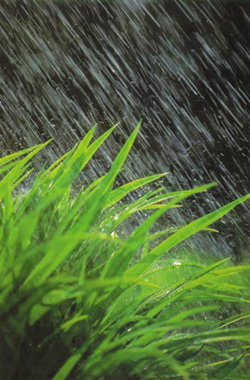The Qur'an and the Signs Leading to Faith

And He has made everything in the heavens and everything on Earth subservient to you. It is all from Him. There are certainly Signs in that for people who reflect.
(Qur'an, 45:13)

Islamic scholars define the "signs leading to faith" as all forms of truth, information, and evidence of creation that lead people to faith, serve as proofs of God's existence and oneness, and reveal His superior might, knowledge, and art. In short, they are the "truths that lead to faith and are a means whereby faith can be acquired and simultaneously enhanced, developed, and perfected."
Although people cannot see God directly, they can comprehend His existence, might, and some of His names by looking at His creation. Just as every painting introduces its artist, all living and inanimate entities introduce us to God, their Creator. Human beings must consider this and bear witness to the proofs of creation. Indeed, in the Qur'an God gives us examples of various animals (e.g., the camel, gnat, bee, and spider) as well as plants, trees, mountains, the Earth, and sky, that serve as signs leading to faith. In other words, we are expected to view them as miracles of creation. Some of the relevant verses in this context are given below:
Have they not looked at the camel—how it was created? And at the sky—how it was raised up? And at the mountains—how they were embedded? And at the Earth—how it was smoothed out? (Qur'an, 88:17-20)
God is not ashamed to make an example of a gnat or of an even smaller thing. As for those who believe, they know it is the truth from their Lord. But as for those who do not believe, they ask: "What does God mean by this example?" He misguides many by it and guides many by it. But He only misguides the deviators. (Qur'an, 2:26)
Your Lord revealed to the bees: "Build dwellings in the mountains and the trees, and also in the structures that people erect. Then eat from every kind of fruit and travel the paths of your Lord, which have been made easy for you to follow." From inside them comes a drink of varying colors, containing healing for humanity. There is certainly a Sign in that for people who reflect. (Qur'an, 16:68-69)
He appointed the Sun to give radiance and the Moon to give light, assigning it phases so that you would know the number of years and the reckoning of time. God did not create these things except with truth. We make the Signs clear for people who know. In the alternation of night and day, and what God has created in the heavens and Earth, there are Signs for people who guard against evil. (Qur'an, 10:5-6)

For thinking and unbiased people, a kitten, a bird, or a flower are all signs leading to faith.
The signs emphasized in these verses are important means whereby every person who thinks about the subject in an unbiased manner can grasp God's existence and draw near to Him.
Of course, these signs are not limited to the examples in these verses, for many other entities, both visible and invisible, also serve this same function. An ant walking in a garden, a flower on a table, a cat in a street or in a house, a dog or a bird, our bodies, the order in the Earth and the sky, rain, the atmosphere that both surrounds us and protects us from harmful rays and objects from outer space, and an infinite number of other things—all of these are signs that lead to faith for people who seek to know God. Just as the life of a giant star can be a great proof of faith, so can our bodily organs be signs leading to faith.
All believers are responsible for using God's verses to understand whatever they see and hear, and to think deeply about them. Every unbiased person is aware of this. Believers also know that they will be unable to account for their behavior if they live among the millions of living things created by God that exist between Earth and the boundless heavens, and yet fail to think about them.
The Qur'an Emphasizes the Signs' Importance

He Who created and molded. He Who determined and guided. He Who brings forth green pasture, then makes it blackened stubble.
(Qur'an, 87:2-5)
The Qur'an clearly reveals that human beings were created by God to worship and serve Him, and that they can expect to live eternally in the Hereafter. Furthermore, He calls upon them to think deeply about the proofs that bear witness to these truths. The Qur'an refers to the phenomena and entities that are certain proofs of God's existence, oneness, and names as "signs." Just as these are written in the Qur'an, they also exist in the world and in a person's soul, for: "There are certainly Signs in Earth for people with certainty, and in yourselves as well. Do you not then see? " (Qur'an, 51:20-21) The same truth is also stated in other verses:
We will show them Our Signs on the horizon and within themselves, until it is clear to them that it is the truth. Is it not enough for your Lord that He is a witness of everything? (Qur'an, 41:53)
In the heavens and Earth there are certainly Signs for the believers. (Qur'an, 45:3)
Among His Signs is the creation of the heavens and Earth and all the creatures He has spread about in them ... (Qur'an, 42:29)
These proofs are not restricted to the Qur'an, but are found everywhere around us. Whether it be a bird alighting on a tree branch, a flower in a garden, or a star in the sky, everything we encounter constitutes a message sent by our Lord to be read in our souls. From this point of view, even a single flower represents an entire letter bearing a message from our Creator to those who can read it.
On the other hand, some signs leading to faith confirm that the Qur'an is the word of God, for God revealed a great many of these signs in a miraculous manner 1,400 years ago. Among these signs are such facts as the expansion of the universe and its creation from nothing, the separation of Earth from the sky, the orbits of heavenly bodies, the Earth's round shape, the sky's role as a protective shield, the atmosphere's layers, the formation of rain, the existence of erosive winds, and why the oceans do not mix with each other. All of these facts have been confirmed by modern science. The fact that information unknown to anyone at the time of the Qur'an's revelation is set out clearly in its verses once again demonstrates that the Qur'an is the word of God.
Thinking and Acquiring Knowledge for Deep Thought
Unbiased people know that everything around them constitutes a proof of faith. They are aware that a seagull diving into the sea to catch its prey, a tiny ant walking on the ground, an apple tree that produces fruit every year, or clouds that remain suspended in the air despite weighing several tons—in short, everything they see—are proofs of God's existence.
The Qur'an refers to two other important features that lead to these signs being deepened and understood: thinking deeply and possessing knowledge.

There is no creature on Earth that is not dependent upon God for its provision. He knows where it lives and where it dies. They are all in a Clear Book.
(Qur'an, 11:6)
• In the Qur'an, God constantly calls on people to think about the proofs of creation in the skies, on Earth, and in all that lies between—in other words, about the signs leading to faith:
In the creation of the heavens and Earth, and the alternation of the night and day, and the ships that sail the seas to people's benefit, and the water that God sends down from the sky—by which He brings Earth to life when it was dead and scatters about in it creatures of every kind—and the varying direction of the winds, and the clouds subservient between heaven and Earth, there are Signs for people who use their intellect. (Qur'an, 2:164)
Several verses state that God expects us to think deeply about what He has created and to learn about the limits He has imposed upon us. All living and non-living things have been created in a way that is designed to encourage us to ponder His superior power of creation, art, and knowledge. As the verses above indicate, everything has been created for a purpose. Ignoring and failing to give these matters their due importance means turning one's back upon His verses, something that all believers must avoid. Indeed, the Qur'an emphasizes that those who turn their backs on God's verses and the proofs of creation are unbelievers.

We sent down cascading water from the clouds, so that by it We might bring forth grains, plants, and luxuriant gardens.
(Qur'an, 78:14-16)
The importance of constantly thinking about these signs to an individual's growth and certainty of belief is emphasized in many verses, such as:
In the creation of the heavens and Earth, and the alternation of night and day, there are Signs for people with intelligence: those who remember God, standing, sitting, and lying on their sides, and reflect on the creation of the heavens and Earth: "Our Lord, You have not created this for nothing. Glory be to You! So safeguard us from the punishment of the Fire." (Qur'an, 3:190-191)
God has revealed that the signs leading to faith have a great significance for thinking people. However, the thinking referred to here does not consist of such clichéd reactions as "How splendidly God has created these" or "What a magnificent animal." We must think long and hard, as well as deeply and in a wide-ranging manner, about what God has created so that we can identify the wisdom and detail in that creation and thus bear witness to His infinite knowledge, might, and artistry.
One method that can be employed is that of questioning and comparing the entities and phenomena around us. In one verse, God gives us an example of such thinking:
If We had willed, We could have made it [the water that you drink] bitter. So will you not give thanks? (Qur'an, 56:70)
Water, a blessing that covers much of the Earth, almost always can be found with ease. The great majority of people have perhaps never even thought once about the water they drink every day. They regard water's existence and how it meets our needs as something that does not require any consideration. The fact is, however, that water's physical and chemical properties could have been very different, had God so willed.
In addition, the atmosphere's structure or temperature could have been different. If that were the case, there would be no clouds and thus no sources of fresh water on Earth. All we would have is the oceans' salt water, in which case humanity either would not have survived or would have done so only in a state of great difficulty and constant crisis. Without fresh water, there would have been no agriculture, and the world would have become a vast desert whose only product is famine. Yet God gave us fresh water just about everywhere in the world. For this, we must thank Him.

People have only to look at their food. We pour down plentiful water, and then split the ground into furrows. Then We make grain grow in it, as well as grapes and herbs, olives and dates.
(Qur'an, 80:24-29)
But to genuinely feel and express that gratitude, first of all we must realize that water is a blessing. This, in turn, depends on "thinking." The example of water applies to all natural entities, living things, and phenomena around us, each of which is a blessing from God. Yet in order to comprehend this, we need to ask: "What would have happened had things been different?" and make the necessary comparisons. And along with this, we must understand that God has created the most delicate balances in all things. The importance of thinking about natural phenomena and "using one's reason" with regard to them is described in another verse:
And in the alternation of night and day, and in the provision God sends down from the sky, bringing Earth to life by it after it has died, and in the varying direction of the winds, there are Signs for people who use their intellect. (Qur'an, 45:5)
Those "people who use their intellect" are believers, because both intelligence and reason are acquired only through faith. Since unbelievers are bereft of reason, they cannot comprehend His signs and so pass by these countless proofs without seeing any of them. Indeed, unbelievers are characterized by a lack of interest in the countless signs in Earth and sky and by behaving as if they were unaware of them. As the Qur'an states:
How many Signs there are in the heavens and Earth! Yet they pass them by, turning away from them. Most of them do not believe in God without associating others with Him. (Qur'an, 12:105-06)
• The second feature required in acquiring a deeper appreciation and understanding of the signs leading to faith is possessing knowledge. But in order to see a subject as a sign leading to faith, there is no need to know its most striking aspects or to have wide and detailed information about it. Rational people, upon looking around themselves, immediately realize the extraordinary nature of what they see and that everything has a Creator. When they see an insect, such as a dragonfly, they know that it has a Creator. The mere existence of a living thing is enough to understand that it is a sign leading to faith. Thinking about the detailed information one can gather about that creature is a means whereby faith and enthusiasm can be increased.
Let's recall the example of water. We know how important this substance is for our lives. Yet when we possess basic physical, chemical, and geographical information about water, we can better comprehend its importance. When we consider its properties in greater detail, we can clearly see that from its properties of freezing, expansion, and viscosity to its chemical properties, water has been created in the most ideal way to support human life. (For more details, see Harun Yahya, The Creation of the Universe, Al-Attique Publishers Inc., Canada, 2000.) This, in turn, is a means to increase our depth of thinking and gratitude.

The shape of raindrops is also the product of a special design.
Both a small child with very limited information and a superbly educated professor who has spent years studying can both see and witness God's signs when they approach the matter with sincerity and an unbiased view. However, in order for people to think deeply about those entities that they cannot see, they require wide-ranging information. With regard to what they can see, they need to learn about them in order to deepen their consideration. Otherwise, their consideration will remain with fixed bounds and may, at times, be superficial. For example, those who have no knowledge of the systems in space but who nevertheless look up at the sky and ponder them will inevitably have different thoughts than those who have a deep knowledge of astronomy. Similarly, the way in which someone with a broad knowledge of the human body's physiology and anatomy comprehends the fine detail, miracles, and marvels apparent in humanity's creation will be deeper and broader than that of someone with no knowledge of the subject. Indeed, God informs us that from the point of view of reasoning and comprehension, those with knowledge are superior to those who have no knowledge:
Such metaphors—We devise them for humanity, but only those with knowledge understand them. (Qur'an, 29:43)
Among His Signs is the creation of the heavens and Earth and the variety of your languages and colors. There are certainly Signs in that for those who know. (Qur'an, 30:22)
What about the one who spends the night hours in prayer, prostrating and standing up, mindful of the Hereafter, hoping for the mercy of his Lord? Say: "Are they the same—those who know and those who do not know?" It is only people of intelligence who pay heed. (Qur'an, 39:9)

However, we need to recall that "information" unaccompanied by the intellect, conscience, and foresight necessary to interpret it, does not lead a person to the truth. The detailed knowledge possessed by a sincere unbiased person is important in his or her quest to know God better and to draw closer to Him. Thus, today's advances in science and technology help us see and witness the knowledge, wisdom, artistry, and fine detail in God's creation from a much closer observation point.
Thanks to such advances, the miracles and beauties in God's creation are beginning to emerge more clearly and in greater detail. People who acquire this information and evaluate it in the light of the wisdom and beauty in God's creation become even more amazed at His infinite might.
